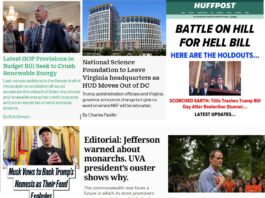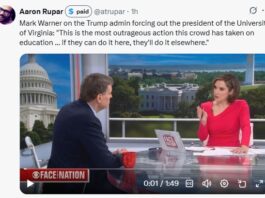Have you wondered why it is that the percentage of Americans approving of the job Trump has been doing as President has been slowly rising?
It’s not that he’s stopped being the wrecking ball, sleazebag, and liar he’s been all along. Consider Trump’s disgraces in just the past few days or weeks–
- his finding “credible” the transparent Saudi lies about the Khashoggi murder;
- his calling the politician who body-slammed a reporter his “kind of guy” (even while the world is in upheaval over the Saudi’s brutal killing and dismemberment of a journalist for being a critic of the political course of the Saudi Crown Prince);
- his announcing he’s pulling out of a treaty that’s played an important role in stabilizing the deterrence between the world’s two main nuclear-armed powers;
- his denial that the Russians are attacking our present election, even as his own Justice Department issues a criminal complaint against one of the Russian attackers….
And these are just in the short time since the Kavanaugh travesty.
Yet, despite all this, Trump has gradually floated upward in the polls, so that for the first time in a very long while, in the FiveThirtyEight chart his net disapproval rating has declined to under 10 percent.
Well, I’ve wondered why Trump’s numbers have been improving. And this morning a plausible explanation came to me.
Almost since the beginning of Trump’s presidency, the news had been peppered with one story after another growing out of the Mueller investigation into possible conspiracy against the United States involving Putin’s minions and Trump’s campaign (as well as other criminality in the Trump inner circle). These stories kept the corruption, lawlessness, and likely betrayal of the nation by Trump and his gang right there in front of the eyes of the American public.
Then came Labor Day, and the famous sixty-day clock according to which federal prosecutors are said to be constrained not to drop any bombshells that might affect the upcoming elections in November.
It was not clear that Mueller was required to abide by that prosecutorial radio silence — in which his work can move forward, but not in any ways that “make news” — given that none of the people he’s investigating are actually running in these mid-terms.
But, it is said, Mueller is a cautious, by-the-book kind of guy. And so, in whatever ways he’s been moving forward, Mueller’s progress has not included any public indictments of major Trump players (like Roger Stone or Don Jr.), or subpoenas to compel testimony from such figures.
With Mueller’s going to ground, the public gets to see Trump doing his impersonation of an American President, without at the same time being reminded of the emerging picture of what a scumbag this President is.
If the public had a firmer grasp on the realities of our situation, that sudden absence of these reminders wouldn’t matter. We’ve all seen plenty enough that we should know without reservation that this man must be checked.
But it is well known how short the memories are of at least a good chunk of the American people. And the sixty-day moratorium on Mueller’s investigation making news allows such public amnesia to benefit Trump.
And indeed, if you look at that chart, you’ll see that Labor Day pretty well marks the point at which Trump’s numbers begin to improve. Not a whole lot, but a shift of only a few percent can matter with this mid-term election, especially when it can reasonably be argued that the fate of American democracy is on the ballot.
Did Mueller make the right decision?
It should be conceded that even if Trump is not running for office now (in contrast to, say, Hillary Clinton, back in October of 2016, when Jim Comey made his disastrous misjudgment, just a week and a half before the election that she lost by a whisker), this election is about Trump more than anything else.
So by that criterion, one might argue that it was right for Mueller to treat his investigation into Trump and his gang as falling into the category of prosecutorial efforts that should go quiet during the pre-election period.
On the other hand, shouldn’t the issue be whether a prosecutor’s course introduces a discontinuity into the situation, whether the prosecutor changes the political climate by his impact on the news?
By that I mean, if a prosecutor suddenly indicts a candidate — more or less out of the blue — that is a discontinuity, and shouldn’t happen.
But by the same token, if a prosecutor suddenly goes silent, after more than a year of visibly moving his investigation forward, that is also a discontinuity. And perhaps that also should not happen.
Mueller’s silence these past almost two months was presumably undertaken in an effort to show neutrality in the upcoming elections. But arguably, his silence has not been neutral, but has represented a shift in the information environment that benefits Trump and, by extension, Trump’s Republican allies.
All in all, I think that Mueller — an admirable guy, for sure — has misjudged here. He’s removed a weight that has been — and should be — weighing on people’s minds. And a few percent of Americans have drifted into greater ignorance that can only help the force of brokenness that has gained so much power in the America of these times. And that so urgently needs to be stopped.
I still expect that the Democrats will get that essential Blue Wave that will give them control of the House. But the magnitude of that wave might have been, and should have been, greater than it will likely be because of Mueller’s misplaced caution.


![Monday News: “Tillis Savages ‘Misinformed’ Trump for ‘Betraying’ Voters”; “Trump’s [Budget] Bill Will Destroy America’s Climate Progress” – and MUCH More!; “What the University of Virginia Should Have Done”; Map of Walkinshaw’s Dominant Victory in VA11](https://bluevirginia.us/wp-content/uploads/2025/06/montage0630-265x198.jpg)
